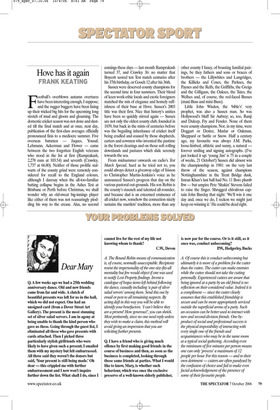Hove has it again
FRANK KEATING
Football’s overblown autumn overtures have been interesting enough, I suppose; and the rugger buggers have been lining up their wicked big hits for the upcoming long stretch of mud and gloom and gloaming. The domestic cricket season was not done and dusted till the final match and at once, next day, publication of the first-class averages officially pronounced finis to a mediocre summer. Five overseas batsmen — Jaques, Yousuf, Lehmann, Ackerman and Flower — came between the two forgotten English veterans who stood in the list at first (Ramprakash, 2,278 runs at 103.54) and seventh (Crawley, 1,737 at 66.80). Neither of those prolific stalwarts of the county grind were remotely considered for recall to the England colours, although I daresay when the all-too-familiar batting collapse begins in the Ashes Test at Brisbane or Perth before Christmas, we shall wonder why an old-sweat big-innings player like either of them was not reassuringly plodding his way to the crease. Alas, no second comings these days — last month Ramprakash turned 37, and Crawley 36: no matter that Boycott scored ten Test match centuries after his 37th birthday, or Gooch 12 after his 36th.
Sussex were deserved county champions for the second time in four summers. Their blend of keen work-ethic locals and exotic foreigners matched the mix of elegance and homely raffishness of their base at Hove. Sussex’s 2003 title was their first. Nice that history’s unities have been so quickly stirred again — Sussex are not only the oldest county club, founded in 1839, but back in the mists of centuries before was the beguiling inheritance of cricket itself being cradled and coaxed by those shepherds, carters and cowmen who invented the pastime in the forest clearings and on those soft rolling downlands and pastures which slide serenely towards the sea.
From midsummer onwards on radio’s Test Match Special, hard as he tried not to, you could always detect a giveaway edge of frisson to Christopher Martin-Jenkins’s voice as he announced Sussex’s progress that day on the various pastoral out-grounds. His son Robin is the county’s staunch and talented all-rounder, and because dad is an esteemed eminence of all cricket now, somehow the connection nicely sustains the martlets’ tradition, more than any other county I fancy, of boasting familial pairings, be they fathers and sons or braces of brothers — the Lillywhites and Langridges, the Killicks and Coxes, the Parkses, the Paynes and the Relfs, the Griffiths, the Greigs and the Gilligans, the Oakses, the Tates, the Wellses and, of course, the red-faced Busses (maxi-Buss and mini-Buss).
Little John Wisden, the ‘bible’s’ very prophet, was also a Sussex man. So was Hollywood’s bluff Sir Aubrey; so, too, Ranji and Duleep, Fry and Fender. None of them were county champions. Nor, in my time, were Doggart or Dexter, Marlar or Oakman, Sheppard or Suttle or Snow. Half a century ago, my favourite was always J.M. Parks, loose-limbed, athletic and sunny, a natural forever smiling and signing autographs. (I’ve just looked it up: ‘young Jim’ is 75 in a couple of weeks, 21 October!) Sussex did almost win the championship in 1981: on the very last throw of the season, against champions Nottinghamshire in the Trent Bridge dusk, Imran Khan’s last ball had No. 11 Bore plumb lbw — but umpire Pete ‘Shakin’ Stevens failed to raise the finger. Shrugged chivalrous captain John Barclay that night: ‘We’ll win it one day and, once we do, I reckon we might just keep on winning it.’ He could be dead right.


















































































 Previous page
Previous page